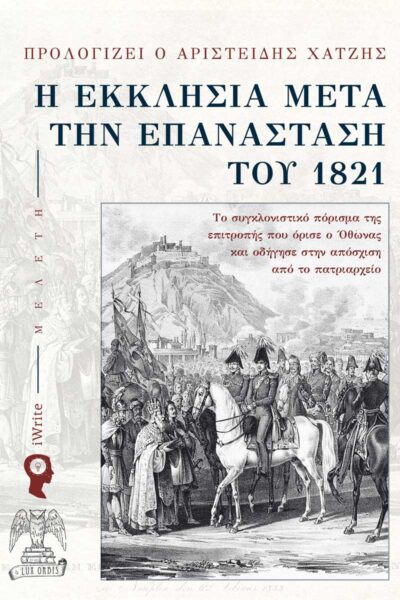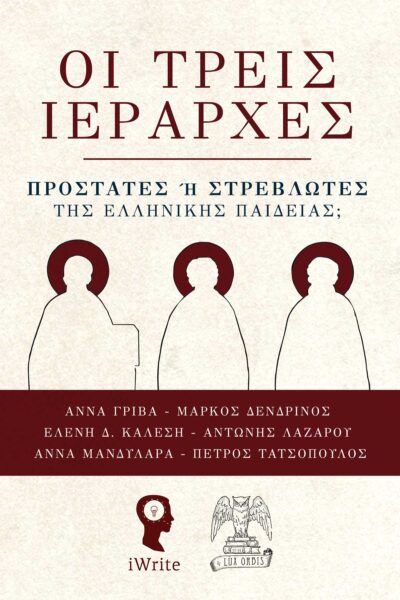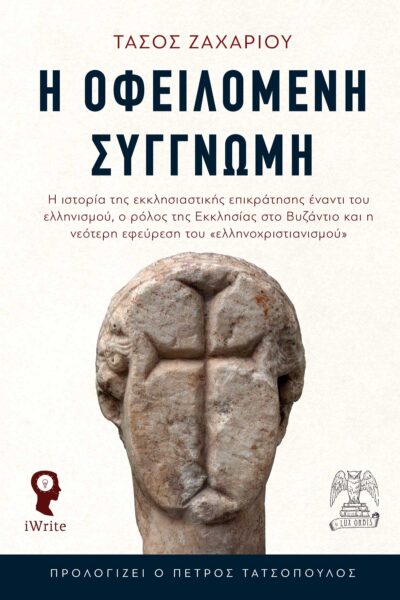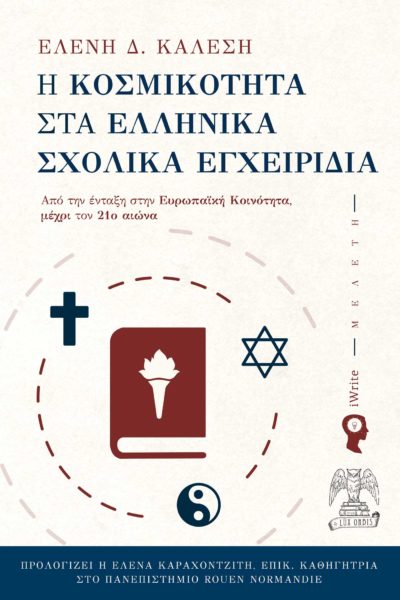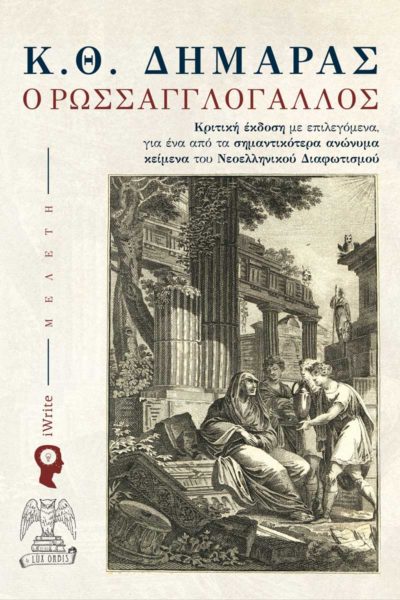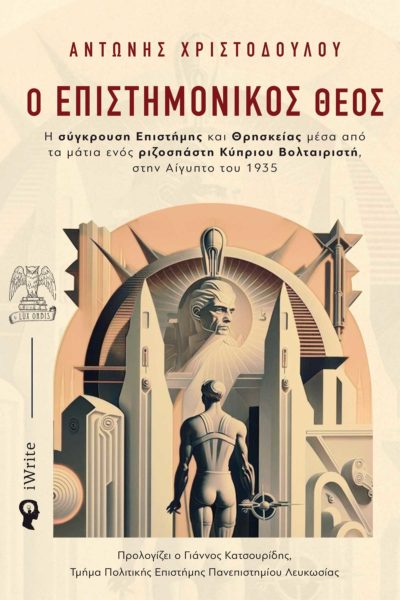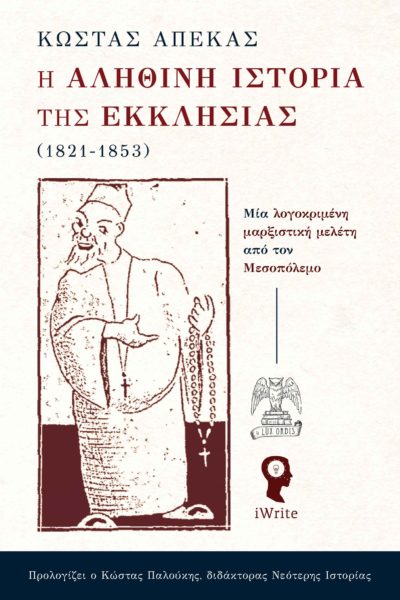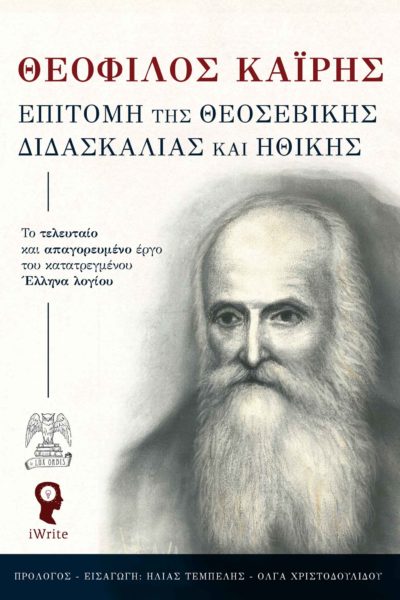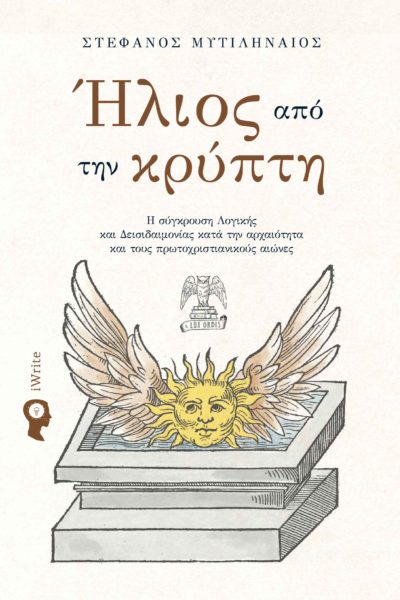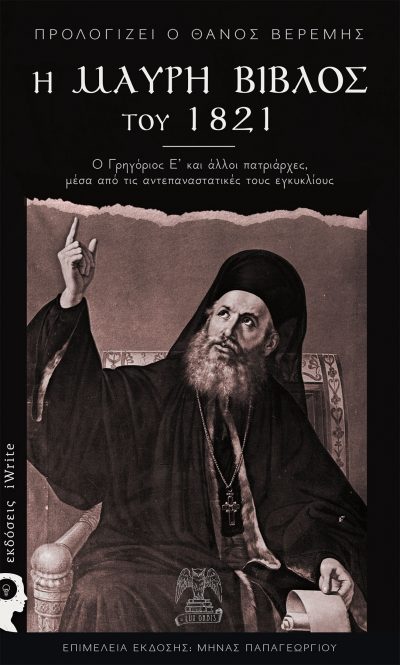To 2021 αναδείξαμε, μέσω της Μαύρης Βίβλου του 1821, την επιστολή που απέστειλε στα 1828, επί διακυβέρνησης Καποδίστρια, ο Κωνσταντινουπόλεως Αγαθάγγελος προς τους επαναστατημένους Έλληνες. Παρά την ξεκάθαρη –αν και όχι τόσο αυστηρή όσο ενδεχομένως θα έπρεπε– απάντηση που έδωσε ο Έλληνας κυβερνήτης, το κείμενο του Αγαθάγγελου δεν αποτελούσε παρά την τελευταία απόπειρα εκ μέρους του πατριαρχείου να πείσει τους ραγιάδες να επιστρέψουν στην αγκαλιά του Σουλτάνου, με αντάλλαγμα –ανάμεσα στα άλλα– την άρση του αφορισμού που είχε επιβάλλει στα 1821 ο Γρηγόριος Ε’. Το δίχως άλλο, επρόκειτο για μία ξεκάθαρη ανάμιξη του Φαναρίου στα εσωτερικά του υπό διαμόρφωση κρατικού οργανισμού, η ύπαρξη του οποίου δύο χρόνια αργότερα, στα 1830, αναγνωρίστηκε επίσημα από τις Μεγάλες Δυνάμεις. Αυτή ακριβώς η ανάμιξη προβλημάτιζε έντονα τις Αρχές του νέου κράτους, που αναλογίζονταν πιθανές ανάλογες μελλοντικές παρεμβάσεις του πατριαρχείου στα κοινωνικοπολιτικά πράγματα της χώρας.
Ο ρόλος και η θέση της Εκκλησίας στο νέο ελληνικό κράτος, λαμβάνοντας υπόψιν και την αρνητική προεπαναστατικά στάση του ανώτατου κλήρου απέναντι στον ξεσηκωμό των Ελλήνων, αποτέλεσε εξαρχής ένα από τα καυτά ζητήματα που κλήθηκε να αντιμετωπίσει η ηγεσία της Ελλάδας.
Μετά τον θάνατο του Καποδίστρια, τον Μάρτιο του 1833 και δύο περίπου μήνες μετά την ανακήρυξή του ως βασιλιά (γεγονός που φανερώνει το μέγεθος της προτεραιότητας του όλου ζητήματος), ο βασιλιάς Όθωνας –ή καλύτερα η Αντιβασιλεία, με προεξέχουσα μορφή τον Γεώργιο Λουδοβίκο Φον Μάουρερ–, επιχείρησε να ξεδιαλύνει το τοπίο, δρώντας άμεσα και κυνικά. Οργανώθηκε μία επταμελής επιτροπή, στην οποία ανατέθηκε να εργαστεί για τους επόμενους δύο μήνες με απώτερο στόχο την κατάθεση μιας ολοκληρωμένης έκθεσης «για την κατάσταση της Ελληνικής Εκκλησίας και των εντός του βασιλείου μοναστηρίων». Μέλη της επιτροπής αποτέλεσαν ο πρωθυπουργός Σπυρίδων Τρικούπης (πρόεδρος), ο Διαφωτιστής και κληρικός Θεόκλητος Φαρμακίδης, ο Σκαρλάτος Βυζάντιος, ο Παναγιώτης Νοταράς, ο Κωνσταντίνος Σχινάς, καθώς επίσης και δύο πρόσφυγες μητροπολίτες, ο Ελαίας Παΐσιος και ο Αρμαδερίου Ιγνάτιος.
Τα συμπεράσματα του πορίσματος της επιτροπής ήταν συνταρακτικά, φανερώνοντας μια σειρά από παθογένειες που χαρακτήριζαν διαχρονικά τον εκκλησιαστικό οργανισμό. Παράλληλα, στο κείμενο ασκήθηκε μία γενναία αυτοκριτική αναφορικά με τη σχέση του ανώτατου κλήρου και της παιδείας προεπαναστατικά, πάντα σε σχέση με την προετοιμασία του ξεσηκωμού απέναντι στους Οθωμανούς, γεγονός που αρκεί από μόνο του για την κατάρριψη μιας σειράς από σχετικούς εθνικούς μύθους που ξεκίνησαν να εμφανίζονται κατά τις επόμενες δεκαετίες. Αν και η εν λόγω έκθεση παραμένει έως σήμερα άγνωστη στους περισσότερους συμπολίτες μας, ακόμα και σε αρκετούς μελετητές της οθωνικής περιόδου, εντούτοις θα μπορούσε να χαρακτηριστεί άκρως σημαντική για έναν και μόνο λόγο: Τα στοιχεία που παρατέθηκαν, αλλά και τα συμπεράσματα που προέκυψαν από αυτή, αποτέλεσαν το κυριότερο αίτιο βάσει του οποίου αποφασίστηκε η γέννηση της Ελλαδικής Εκκλησίας και η οριστική διοικητική αποσύνδεσή της από το πατριαρχείο της Κωνσταντινούπολης. Μια τέτοια βίαιη μεταβολή στα εκκλησιαστικά τεκταινόμενα του ελλαδικού χώρου, που σημειωτέον αποτέλεσε πρακτικά το μοναδικό πρόταγμα του Νεοελληνικού Διαφωτισμού που εντέλει ικανοποιήθηκε μετεπαναστατικά, ήταν δεδομένο ότι θα έφερνε μαζί της ισχυρούς τριγμούς, τόσο σε ό,τι αφορά τη στάση του πατριαρχείου Κωνσταντινουπόλεως, όσο και στο εγχώριο παιχνίδι, με πολιτικούς και εκκλησιαστικούς παράγοντες, αλλά και τις Μεγάλες Δυνάμεις, να συμμετέχουν τα επόμενα χρόνια σε έναν φθοροποιό πόλεμο ιδεών στην ελληνική δημόσια σφαίρα.
Ποια ήταν όμως τα ζητήματα εκείνα με τα οποία καταπιάστηκαν τα μέλη της επαμελούς επιτροπής, στο έγγραφο που εντέλει δημοσιεύτηκε με τίτλο Έκθεσις περιεκτικὴ τῆς ἐνεστώσης καταστάσεως τῆς Ἑλληνικῆς Ἐκκλησίας καὶ τῶν ἐντὸς τοῦ βασιλείου μοναστηρίων, ἐφ’ ᾗ καὶ σχέδιον διοργανισμοῦ, ἀφορῶντος τὴν βελτίωσιν τῶν ἐκκλησιαστικῶν, παρὰ τῆς ἐπὶ τούτῳ διορισθείσης ἐπιτροπῆς διὰ τοῦ ἀπὸ 15)27 Μαρτίου 1833 Βασιλικοῦ Διατάγματος και στα οποία φρονώ πως αξίζει να σταθούμε στο εισαγωγικό αυτό σημείωμα;
Α) Η παιδεία. Τα μέλη της επιτροπής παραδέχονται ότι η αμάθεια είχε παρεισφρήσει στον κλήρο κατά την περίοδο της Τουρκοκρατίας, ενώ η Εκκλησία υπήρξε αμέτοχη στην πρόοδο των Φώτων. «Το ενδοξότερον χαρακτηριστικόν του Ελληνικού Κλήρου δεν είναι η Παιδεία», τονίζεται χαρακτηριστικά.
Β) Για τον πατριάρχη Γρηγόριο Ε’ αναφέρεται απλώς ότι θανατώθηκε από τους Τούρκους στις αρχές του επαναστατικού αγώνα, δίχως τις ηρωοποιήσεις που ξεκινούν να καταγράφονται τα επόμενα χρόνια.
Γ) Υπερτονίζονται οι αλόγιστες χειροτονίες που λάμβαναν χώρα από πατριάρχες και μητροπολίτες σε όλη την επικράτεια, γεγονός που πρακτικά οδηγούσε σε… αγοραπωλησίες επισκοπών και ως εκ τούτου σε βαριά φορολογία που επιβαλλόταν στους Έλληνες εκ μέρους των εκπροσώπων της Εκκλησίας, από τη στιγμή που οι τελευταίοι είχαν πλέον ως κύριο στόχο τους την αργυρολογία για την απόσβεση των εξόδων που είχαν προηγουμένως πραγματοποιήσει. Για να το επιτύχουν αυτό, μεταχειρίζονταν μια σειρά από εκβιαστικά μέσα, ανάμεσα στα οποία συμπεριλαμβάνονταν τα επιτίμια, οι καταχρηστικοί αφορισμοί και τα συγχωροχάρτια προς τον λαό. Είναι εξόχως χαρακτηριστική η φράση που καταγράφεται στο πόρισμα και αναφέρει πως «η κατάχρησις αὕτη ἐπέφερεν ὀλεθριώτατα ἀποτελέσματα ὡς πρὸς τὴν ὑπόληψιν τοῦ Kλήρoυ».
Δ) Η αριθμητική σχέση μεταξύ ιερέων και μοναστηριών σε σχέση με τους κατοίκους του ελλαδικού χώρου κρίνεται δυσανάλογη.
Ε) Το άγιο Όρος. Η επιτροπή τηρεί κριτική στάση απέναντι στους αγιορίτες, κάνοντας λόγο για μοναχούς που χαρακτηρίζονται διαχρονικά από φιλοκέρδεια και αργυρολογία, με σκοπό να περάσουν άνετα το υπόλοιπο της ζωής τους.
Πέρα από την καταγραφή των παθογενειών της Εκκλησίας, στο δεύτερο μέρος της έκθεσής της η επιτροπή παραθέτει τις προτάσεις της για τη λύση των προβλημάτων που επισημαίνει. Στο πλαίσιο αυτό, πάντα περιγραφικά, προτείνει:
1) Τη διοικητική απόσπαση της Εκκλησίας της Ελλάδας από το πατριαρχείο Κωνσταντινουπόλεως. «Ὑποκειμένη αὕτη εἰς ἐκείνην, δὲν θέλει βελτιωθῆ ποτέ· διότι οὔτε ἡ εἰς ἣν μέλλει νὰ ὑπόκη και θέλει βελτιωθῆ, ἐν ὅσῳ εὑρίσκεται δουλεύουσα ὑπὸ ἔθνος ἀλλόφυλον καὶ ἀλλόθρησκον», σχολιάζουν χαρακτηριστικά τα μέλη της επιτροπής. Και πιο κάτω, τονίζοντας ότι με το Αυτοκέφαλο δεν παραβιάζεται κανένας εκκλησιαστικός κανόνας, χρησιμοποιούν ένα επιχείρημα που αιφνιδιάζει, υποστηρίζοντας πως, όπως συνέβαινε κατά τη σύσταση της Εκκλησίας στους πρώτους μεταχριστιανικούς αιώνες, η κάθε «μερική» Εκκλησία που δεν βρισκόταν κάτω από τη σκέπη άλλης μεγαλύτερης αποτελούσε δείγμα «αληθινής δημοκρατίας»!
Και κάτι εξίσου σημαντικό και αξιοπρόσεκτο, για το οποίο αξίζει να αφιερώσουμε λίγες γραμμές παράθεσης κειμένου από την ίδια την έκθεση. Για τον Φαρμακίδη, τον Τρικούπη και τους συνεργάτες τους, η απόφαση για τον πλήρη χωρισμό Εκκλησίας της Ελλάδος και Πατριαρχείου Κωνσταντινουπόλεως έχει ήδη ληφθεί από τις απαρχές της Ελληνικής Επανάστασης. Κατά την άποψή τους, στην εποχή τους οι νόμοι του Βυζαντίου δεν έχουν πλέον καμία ισχύ. Διαβάζουμε χαρακτηριστικά: Ἀλλ’ ὅ,τι ἀποφασίζομεν ἡμεῖς τὴν σήμερον, τοῦτο εἶναι ἀποφασισμένον ἀπὸ τὸ 1821 ἔτος· ἔκτοτε οἱ Ἕλληνες ἔπαυσαν ἀπὸ τοῦ νὰ ἔχωσι σχέσεις πρὸς τὴν Ἐκκλησίαν τῆς Κωνσταντινουπόλεως, καὶ ἀπὸ τοῦ νὰ θεωρῶσι νομίμως καὶ κανονικῶς χειροτονουμένους τοὺς ἐκεῖθεν εἰς τὴν Ἑλλάδα πεμπομένους ἐπισκόπους μετὰ τὸν μαρτυρικὸν θάνατον τοῦ Πατριάρχου Γρηγορίου· διότι καὶ ἔκτοτε διέῤῥηξαν καὶ πάντα πολιτικὸν δεσμὸν πρὸς τὸν Σουλτάνον τῶν Τούρκων. Οἱ ἐπίσκοποι τῆς Ἑλλάδος ἔκτοτε ἔπαυσαν ἀπὸ τοῦ νὰ μνημονεύωσι τὸν Πατριάρχην τῆς Κωνσταντινουπόλεως, καὶ ἀντ’ αὐτοῦ ἐμνημόνευον, ὡς καὶ μνημονεύουσι (πάσης ἐπισκοπῆς ὀρθοδόξου)· καὶ συνῄνει κατὰ τοῦτο ὅλος ὁ λοιπὸς Κλῆρος καὶ ὅλος ὁ λαός, καὶ ἤθελε ταραχθῆ, ἂν ἤκουε μνημονευόμενον Πατριάρχην, μὴ ἀναγνωριζόμενον παρ’ αὐτοῦ.
Ὅθεν ἡ Ἐκκλησία τοῦ νῦν Βασιλείου τῆς Ἑλλάδος θεωρεῖται καὶ εἶναι πραγματικῶς ἀνεξάρτητος ἀπὸ τῆς ἐν Κωνσταντινουπόλει Ἐκκλησίας, εἰς ἥν πρότερον ὑπέκειτο, ἀπ’ ἀρχῆς τοῦ Ἑλληνικοῦ ἀγῶνος, καὶ ἡ ἀνεξαρτησία αὕτη μένει κατὰ πάντα λόγον ἀδιαφιλονείκητος.
Θεωρεῖται δὲ καὶ εἶναι τοιαύτη καὶ δικαιωματικῶς· διότι α’) οἱ βυζαντινοὶ αὐτοκρατορικοὶ νόμοι δὲν τὴν ὑποχρεόνουσι καὶ τὴν σήμερον, ἐλευθέραν καὶ αὐτόνομον οὖσαν. β’) Οἱ περὶ πραγμάτων μὴ ἀναγομένων ἀμέσως εἰς τὴν θρησκείαν καὶ εἰς τὰ δόγματα καὶ εἰς τ’ ἀφορῶντα ταῦτα Συνοδικοὶ Κανόνες δὲν ἰσχύουσι πάντοτε καὶ πανταχοῦ”.
2) Μία δεύτερη και άκρως σημαντική πρόταση των μελών της επιτροπής προς την Αντιβασιλεία αφορά στο καθεστώς λειτουργίας της Εκκλησίας. Η ανεξαρτησία της από την κοσμική εξουσία κρίνεται επικίνδυνη, έτσι προτείνεται η κυριαρχία της βασιλικής εξουσίας επί του εκκλησιαστικού οργανισμού. Ο βασιλιάς χαρακτηρίζεται ως πολιτικός αρχηγός της Εκκλησίας, ενώ ταυτόχρονα είναι υπεύθυνος για τον διορισμό των επισκόπων. Αυτή η πρόταση και η μετέπειτα αποδοχή της από την Αντιβασιλεία αποτέλεσε ιστορικά την αφετηρία για τον σφιχτό εναγκαλισμό κράτους και εξουσίας στο νέο ελληνικό κράτος. Ωστόσο, βλέποντας το συγκεκριμένο αίτημα με τα μάτια εκείνης της εποχής, αντιλαμβάνεται κανείς το πόσο επικίνδυνος θεωρούνταν για τη συνοχή ενός λαού υπόδουλου επί δεκατέσσερις αιώνες ένας ανεξέλεγκτος θεσμός, με πηγαία υπερεθνική ιδεολογία, που επί αιώνες νοιαζόταν
αποκλειστικά για την επιβίωσή του μέσα σε οποιεσδήποτε συνθήκες διαμορφώνονταν σε κάθε εποχή. Με δυο λόγια, στα μάτια του Φαρμακίδη και των συνεργατών του, οι στενές σχέσεις Κράτους (βασιλείου) και Εκκλησίας ήταν ένα αναγκαίο κακό.
3) Για την επιτροπή, η επαρκής μισθοδοσία των ιερέων από το ελληνικό κράτος αποτελεί προϋπόθεση για την αποφυγή φαινομένων κατάχρησης ή άλλων παράνομων ενεργειών εκ μέρους του κλήρου: «Πόθεν καὶ πῶς διετρέφετο μέχρι τοῦδε ὁ Κλῆρος τῆς Ἀνατολικῆς Ἐκκλησίας, καὶ εἰς πόσας καταχρήσεις ἔπιπτεν οὗτος, ἔγινε γνωστὸν ἐκ τῶν προηγουμένων. Ἂν καὶ εἰς τὸ ἑξῆς μένῃ ἀπεριποίητος παρὰ τῆς κυβερνήσεως καὶ δὲν ἀπολαμβάνῃ τὴν εἰς αὐτὸν ἀνήκουσαν τιμήν, δυσκόλως ἠμπορεῖ ν’ ἀποκτήσῃ ἡ Ἑλλὰς Κλῆρον ἄξιον τοῦ τέλους, πρὸς ὃ οὗτος διωρίσθη ἐξ ἀρχῆς εἰς τὴν Ἐκκλησίαν· διότι πᾶς ἄνθρωπος αἰσθανόμενος εἰς ἑαυτὸν ἀξιότητα καὶ ἱκανότητα εἰς ἄλλο τι ἔργον καὶ ἐπάγγελμα ἐντιμότερον καὶ ἐπικερδέστερον, θέλει προτιμᾷ τοῦτο ἀπὸ τῆς εἰς τὸν Κλῆρον κατατάξεώς του. Ὅταν ὁ Κλῆρος ἔχῃ ἀρκούντως τ’ ἀναγκαῖά του παρὰ τῆς κυβερνήσεως, τότε ὑποχρεοῦται εἰς τὸ ν’ ἀποφύγῃ καὶ πᾶσαν κατάχρησιν (…)». Παρ’ όλα αυτά, η κρατική μισθοδοσία προτείνεται να πραγματοποιείται μόνο για τους επισκόπους και το περιβάλλον τους, ενώ για τους διακόνους και τους πρεσβυτέρους πηγές χρηματοδότησης να αποτελούν οι κατά τόπους χριστιανικές κοινότητες, με το κράτος να παρεμβαίνει σε περίπτωση ελλιπούς κοινωνικής συνεισφοράς. Να σημειωθεί, επίσης, ότι για όλους τους διακόνους ή πρεσβύτερους που χειροτονούνται, η επιτροπή προτείνει να έχουν προηγουμένως λάβει την απαραίτητη μόρφωση και σχολική εκπαίδευση.
4) Κρίνεται ότι τα έσοδα από την εκμετάλλευση των μοναστηριακών γαιών ξοδεύονται ἀσκόπως καὶ ἀνωφελῶς, ενώ κάλλιστα θα μπορούσαν να διατεθούν για τη μισθοδοσία των επισκόπων. Γνώμη της επιτροπής είναι ότι ο αριθμός των μοναχών και των μοναστηριών πρέπει να περικοπεί δραστικά, ενώ επιτακτική είναι η δήμευση μεγάλου μέρους της εκκλησιαστικής περιουσίας προς όφελος του κοινωνικού συνόλου.
Εκατόν ενενήντα ένα χρόνια μετά την κοινοποίησή της προς τον Μάουρερ και τον νεαρό Όθωνα, η δημοσιοποίηση της Έκθεσης των Επτά από τη Σειρά Lux Orbis, με πρόλογο του καθηγητή Αριστείδη Χατζή, φωτίζει με τον πλέον χαρακτηριστικό τρόπο τις ιδιαίτερες πολιτικές συνθήκες εκείνης της εποχής και κυρίως τη θέση της Εκκλησίας, ως οργανισμού, στις συνειδήσεις των πρώτων αξιωματούχων του νέου ελληνικού κράτους. Τους επόμενους δύο αιώνες, ο στενός εναγκαλισμός Κράτους και Εκκλησίας στη χώρα μας αποτέλεσε και εξακολουθεί να αποτελεί την πηγή αμέτρητων προβλημάτων σε κάθε σχεδόν πτυχή του δημόσιου βίου, γεγονός που προκαλεί –ιδίως κατά τις τελευταίες δεκαετίες– ριζικές αλλαγές στη στάση της ελληνικής κοινωνίας απέναντι στην ιεραρχία, ως θεσμό. Έχοντας κατά νου τα προηγούμενα, φρονώ πως δεν αργεί η στιγμή που μία νέα επιτροπή θα εισηγηθεί σε μία μελλοντική κυβέρνηση της χώρας τον πλήρη διαχωρισμό Κράτους και Ελλαδικής Εκκλησίας, πέρα και πάνω από όλα ως αποτέλεσμα ενός ώριμου κοινωνικά αιτήματος.
Μηνάς Παπαγεωργίου,
διευθυντής Σειράς Lux Orbis


